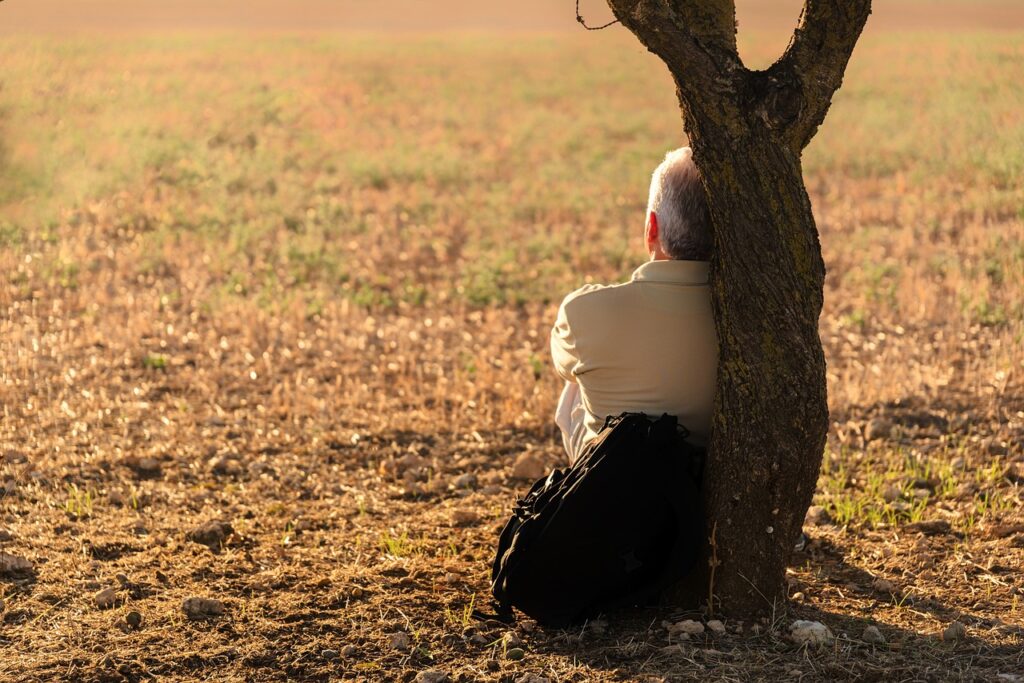Glorious Solitude: Embracing God’s Gift in a Busy World
In today’s relentless pace, solitude and rest often feel like luxuries. However, Scripture teaches that these practices are essential for spiritual growth, renewal, and connection with God. Jesus exemplified a life balanced between serving others and withdrawing to quiet places to commune with His Father. By following His lead, we, too, can draw strength, focus, and rest. Solitude and Sabbath invite us to step back, embrace God’s peace, and remember our worth in Him.
The Biblical Foundation of Rest and Solitude
Rest and solitude are not modern concepts of self-care; they are deeply rooted in Scripture. After six days of creation, God rested on the seventh day, blessing and sanctifying it (Genesis 2:2-3). God didn’t need rest, but His example established a rhythm for us—a reminder that we are more than our productivity.
The fourth commandment underscores this pattern, instructing the Jews to keep the Sabbath holy and dedicate it to rest and worship (Exodus 20:8-11). Observing the Sabbath is a way of honoring God with our time, acknowledging our dependence on Him. It’s an opportunity to step back, recharge, and trust that He will provide even as we rest.

The Sabbath Is A Gift to Man
Although the Sabbath is generally regarded as part of the Mosaic Law and not directly applicable today, its principles—pausing from work, seeking rest, engaging in worship, and renewing our relationship with God—are deeply needed in our lives now. Dismissing the Sabbath as unnecessary for Christians in the church age misses the true heart of its purpose. Jesus reminds us in Mark 2:27, “The Sabbath was made for man”—a gift from God for our benefit, perhaps even to soften the burden of work outlined in Genesis 3:17-19. If God created the Sabbath for us, then it’s a blessing to embrace and enjoy. We can avoid legalism by understanding that Sabbath rest is a personal conviction and should be celebrated as God leads each believer (Colossians 2:16-17). However, we should exhort one another (Hebrews 3:13; 10:24) to rest from the busyness of the world and cherish sacred, quiet moments in God’s presence.
Throughout this article, I’ll use the term “Sabbath” to refer to resting from the things of the world to fellowship with God. I like the term Sabbath because it carries with it a spiritual depth which I believe is necessary for Christians to effectively rest during their Christ-Centered Walk. It should surprise no one that Christian rest is different than worldly rest. Even though the world recognizes the need for downtime, it doesn’t include the critical spiritual component in their recommendations.
Jesus’ Practice of Solitude and Rest
Jesus, though constantly surrounded by people in need, often withdrew to quiet places for prayer and solitude. In Mark 1:35, we see Him rising early to pray alone, and in Luke 5:16, He “often withdrew into the wilderness.” Jesus, who was both fully human and fully divine, showed that solitude and rest are essential to sustaining our connection with God. With Jesus as our example, let us embrace this vital way of communing with God, drawing strength, peace, and renewal from quiet, restful moments spent in His presence.
Rest as Worship and Trust
Sabbath resting is more than simply taking a break; it’s a form of worship. Psalm 46:10 calls us to “Be still, and know that I am God.” By resting, we acknowledge God’s sovereignty, reminding ourselves that our identity and purpose come from Him. Jesus invites us to find rest in Him: “Come to Me, all you who labor and are heavy laden, and I will give you rest” (Matthew 11:28-30). This invitation extends beyond physical rest, offering deep spiritual peace. Regular times of solitude allow you to gather your thoughts and remember all that God has done and is doing in your life, adding depth to your gratefulness and worship.

Embracing Quiet Time with God
In our noisy lives, intentional quiet time with God allows us to listen for His voice and receive His guidance. In solitude, we can gather, reflect, grow, and find strength. Psalm 62:1 says, “Truly my soul silently waits for God,” teaching us that waiting and quietness reveal His presence.
Building a Quiet Time Routine
- Choose a Specific Time and Place: Find a time and place free from distractions, such as early morning or late evening.
- Start with Prayer: Confess any known sins (Psalm 66:18; 1 John 1:9) and invite the Holy Spirit to guide your time.
- Read and Reflect on Scripture: Choose a passage to read. Ask God to open your eyes to behold wonderful things from His precious Word (Psalm 119:18). Then, meditate on the meaning of what you read and what the Holy Spirit prompts in your heart.
- Respond in Prayer and Worship: Offer your heart to God, expressing your thoughts and thanks.
- Journal Your Thoughts: Recording your reflections helps track growth and remember God’s faithfulness.
Overcoming Obstacles to Solitude
For many, busyness, distractions, and feelings of inadequacy can hinder quiet time with God. Prioritizing quiet time, minimizing distractions, giving yourself grace, and having accountability can make all the difference.
Practical Tips for Quiet Time
- Start Small: Begin with 10-15 minutes daily and gradually extend the time. Read and pray through one chapter of Scripture or read a daily devotion like “My Utmost for His Highest” or “Streams in the Desert.” The goal, especially if you are just starting, is consistency. Don’t overwhelm yourself.
- Be Flexible: Quiet time can vary—some days may focus on prayer, others on reading. Also, if you happen to miss a quiet time during the week, don’t beat yourself up, but be sure to get right back to it. You are developing a lifetime habit and you should recognize there will be occasional misses.
- Celebrate Small Steps: Acknowledge progress in connecting with God, however small. In fact, praise God for your quiet times and for any insights you gain. You experienced time with the King–and that is something to celebrate!
- Keep Your To-Do List Handy: If your thoughts constantly run to things you need to do, keep a pen and notepad in your quiet space so you can quickly jot a reminder for later. This frees your mind from worrying you might forget something and allows you to concentrate on you heart’s true desire.

The Sabbath Is a Reminder
The Sabbath is often misunderstood as a legalistic rule. In reality, it is God’s invitation to pause, renew, and focus on Him. The Sabbath, instituted at creation, serves as a reminder that God is our ultimate provider and that our worth isn’t defined by productivity. Like all spiritual matters, God is more concerned with the heart than with outward actions. Calming your restless soul and turning your focus to Him demonstrates both love and reverence, leading to Christian authenticity.
The Blessing of the Sabbath: Remembrance
As mentioned earlier, Jesus described the Sabbath as a gift, not a burden (Mark 2:27). Observing the Sabbath is not about rigid rules but about experiencing rest and God’s presence. It allows us to step back, gain perspective, and remember our Creator. Forgetting God seems to occur naturally in our busyness (Deuteronomy 8:11-17). Observing Sabbath rests place priority on our relationship with God, elevating it above the mundane things of life so we never forget God. Stillness provided by spiritual rest is a requirement to knowing God intimately (Psalm 37:7; 46:10). I fear many Christians do not experience deep fellowship with God because they never develop quietude in their life.
Applying the Sabbath in Modern Life
In a world that glorifies busyness, honoring the Sabbath can seem challenging. However, observing a day of rest doesn’t have to be about a specific day but about prioritizing rest and God. Here’s how to do that practically:
- Set Boundaries: Decide which day you’ll honor as the Sabbath.
- Plan Restful Activities: Engage in activities that refresh you spiritually and emotionally.
- Limit Digital Distractions: Take a break from screens to fully engage in the moment. As much as possible, avoid things that might disrupt your tranquility. (For me, I try to avoid political news!)
- Focus on Worship and Reflection: Use the Sabbath to worship, attend church, and reflect on God’s goodness.

Avoiding Burnout and Embracing Balance
Our fast-paced, success-driven culture often leads to burnout, even in ministry. Understanding how to avoid burnout is essential for a sustainable spiritual life.
Recognizing Burnout
Burnout usually isn’t referring to physical exhaustion; it’s a deep spiritual and emotional depletion. It can cause chronic fatigue, irritability, spiritual dryness, and feelings of hopelessness. In 1 Kings 19, God responds to Elijah’s burnout by offering rest and nourishment, showing the importance of caring for our whole selves.
Practical Steps to Avoid Burnout
- Set Clear Boundaries: Say no to overcommitting. Ecclesiastes 3:1 reminds us that there is a time for everything.
- Establish a Rhythm of Rest: Create regular times of rest to avoid becoming overwhelmed. If you use scheduling software, put your times of rest on your calendar.
- Care for Body, Mind, and Spirit: Nourish yourself physically, mentally, and spiritually.
- Seek Community Support: Share your burdens with friends, mentors, or small groups (Galatians 6:2). Don’t be shy–ask for prayer from friends and your church prayer group in addition to your own prayers.
Finding Rest in God’s Presence
Psalm 23 beautifully describes true rest: “He makes me to lie down in green pastures…He restores my soul.” Jesus invites us to find rest in Him, exchanging our burdens for His peace (Matthew 11:28-30). Sabbath times provide space for soul rejuvenation.
Practical Steps to Rest in God’s Presence
- Start Each Day with God: Begin your day with prayer, Scripture reading, and/or a short devotion.
- Take “Mini-Sabbaths”: Integrate brief moments of prayer or silence throughout the day.
- End with Reflection: Before bed, thank God for His presence.
- Practice Gratitude: Regularly thank God for His blessings to cultivate peace. Don’t underestimate the power of gratitude.

Embracing a Lifestyle of Rest and Solitude
Rest and solitude aren’t one-time practices; they are a lifestyle of connecting deeply with God and living in His strength and guidance.
Building Sustainable Rhythms of Rest
Mark 6:31 shows Jesus inviting His disciples to rest: “Come aside by yourselves to a deserted place and rest a while.” Regularly setting aside time for God helps us stay grounded.
- Establish Boundaries: Create intentional pauses for rest.
- Guard Against Overcommitment: Prioritize activities that align with God’s purpose.
- Beware of Distractors: Television, cell phones, emails, Facebook, and a host of other things will be temptations to distract you from your times of quietness. Set limits and be disciplined.
The Impact of Rest on Relationships
Rest allows us to be present with those we love. In Luke 10, Mary chose to sit at Jesus’ feet instead of bustling about, reminding us that prioritizing God enables us to better serve others.
Leaving a Legacy of Rest and Trust
Our practice of rest can inspire others. Psalm 127:1-2 emphasizes God’s provision, reminding us that true rest is found in dependence on Him. As we model a life of trust and balance, we inspire others to find their peace in God.
Practical Tips for Developing a Lifestyle of Rest and Solitude
- Maintain Set Boundaries: Clearly define times of rest and solitude and hold them sacred. The adversary will try to prevent you from keeping these times because they will draw you closer to God, spiritually energizing you for spiritual warfare.
- Plan Personal Retreats: Schedule occasional retreats for focused time with God. An occasional weekend alone or with your spouse to focus on God works wonders for your spiritual well-being.
- Incorporate Daily Rest Moments: Integrate short breaks for peace and reflection. Rather than turning to your phone to play a game or scan Facebook, reflect on a memory verse.
- Encourage Family and Community Involvement: Invite loved ones to join you in practicing rest. Many Christians miss an intimate relationship with God because they never consider taking a rest from worldly activities to focus on the more important spiritual world.
- Adjust as Needed: Reflect on and adapt your rest practices to stay spiritually refreshed.
Conclusion
Solitude and rest are gifts from God that invite us to embrace His peace, focus on His presence, and live balanced lives in a world that rarely stops. These practices are not burdens but blessings, essential for a fulfilling walk with Christ. They allow us to step back, listen for His voice, and grow in Him.
As you seek to make solitude and rest a part of your life, trust that God will meet you in those quiet moments, offering peace, strength, and clarity. Whether it’s a few minutes each day or a dedicated Sabbath, start where you are, and let the journey bring you closer to the heart of God.
Years ago I read a very good book on this subject. It is called Margin. I recommend it if you are experiencing burnout and overload.








2 Comments
Comments are closed.